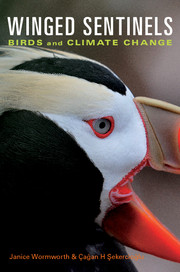Book contents
- Frontmatter
- CONTENTS
- ACKNOWLEDGEMENTS
- Introduction: The Free Advice of Birds
- Chapter 1 Phenology: Seasonal Timing and Mismatch
- Chapter 2 Migratory Birds Face Climate Turbulence
- Chapter 3 Range Shifts and Reshuffled Communities
- Chapter 4 Seabirds Herald Ocean Changes
- Chapter 5 Climate Change, Abundance and Extinction
- Chapter 6 Tropical Warming and Habitat Islands
- Chapter 7 Shifting Ground on Conservation
- NOTES
- INDEX
- PLATE SECTION
- PLATE SECTION
- PLATE SECTION
Introduction: The Free Advice of Birds
Published online by Cambridge University Press: 05 March 2012
- Frontmatter
- CONTENTS
- ACKNOWLEDGEMENTS
- Introduction: The Free Advice of Birds
- Chapter 1 Phenology: Seasonal Timing and Mismatch
- Chapter 2 Migratory Birds Face Climate Turbulence
- Chapter 3 Range Shifts and Reshuffled Communities
- Chapter 4 Seabirds Herald Ocean Changes
- Chapter 5 Climate Change, Abundance and Extinction
- Chapter 6 Tropical Warming and Habitat Islands
- Chapter 7 Shifting Ground on Conservation
- NOTES
- INDEX
- PLATE SECTION
- PLATE SECTION
- PLATE SECTION
Summary
Rockhopper numbers drop off cliff
The ability of the birds to show us the consequences of our own actions is among their most important and least appreciated attributes. Despite the free advice of the birds, we do not pay attention.
Marjory Stoneman Douglas, 1947In the world's southern oceans, the declining fortunes of a small penguin hint at a profound and widespread change in its environment. Ocean warming is suspected but many questions remain, in part because it is not easy to study southern rockhopper penguins, Eudyptes chrysocome. Getting to their remote colonies, like those on Campbell Island, is costly and logistically challenging. Then there is the subantarctic weather. Storm-force winds routinely blast the island, and rain and drizzle drench it most days of the year.
Arriving at a rockhopper colony, one finds hundreds or thousands of incubating birds, packed cheek by jowl, just beyond pecking distance of each other. Others jump along steep, rocky slopes, intent on their daily commutes between nest and ocean. This penguin's reputation as one of the most aggressive penguins tallies with its appearance: red eyes, black head feathers evocative of a punk rock singer, and yellow eyebrows ending in plumes that fly in a golden halo when it shakes its head to attract a mate. When a human visitor passes amongst them, rockhoppers slowly rotate on their nests, hundreds of eyes fixed on the interloper. If one should approach too closely, an incubating bird will attack. Though standing well short of a human knee it will nip the intruder's legs with its beak and batter them with a tattoo of its sharp flippers. ‘If you pick them up, they go bananas,’ says marine biologist David Thompson of New Zealand's National Institute of Water and Atmospheric Research, who has studied these seabirds.
- Type
- Chapter
- Information
- Winged SentinelsBirds and Climate Change, pp. 1 - 8Publisher: Cambridge University PressPrint publication year: 2011



